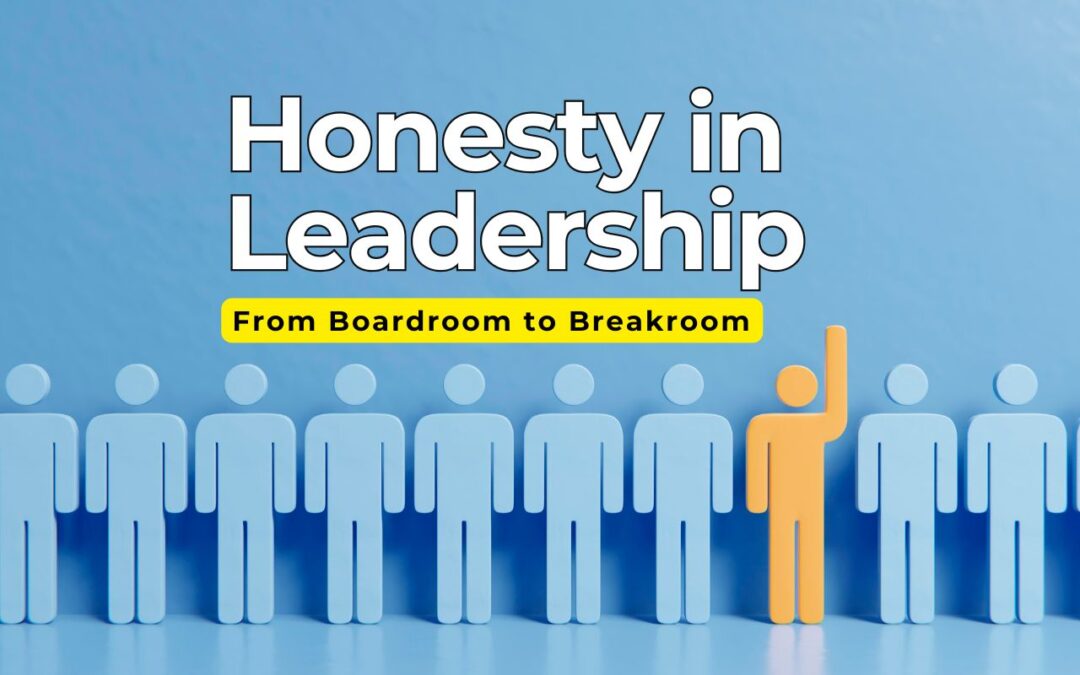Honesty Isn’t Just a Value — It’s a Daily Practice
Let’s be honest — honesty in leadership isn’t always easy. It’s not just about telling the truth when confronted or giving feedback during performance reviews. It’s about living and breathing truthfulness every single day, from the decisions made in the boardroom to the way a manager speaks to a colleague in the breakroom. Honesty, when practiced consistently, becomes more than a virtue. It becomes culture. And in today’s fast-paced, high-stakes business world, honest leadership is no longer optional — it’s a necessity.
According to a global workforce survey, 87% of employees say they want to work for a company that is transparent and honest. Yet, only 15% believe their leaders consistently communicate openly. This disconnect is costing businesses not only their credibility but also their talent, productivity, and long-term growth.
In this blog, let’s unpack how leaders can make honesty a daily habit — not a one-time declaration or a paragraph in a mission statement — and why doing so from the boardroom to the breakroom can change everything.
1. Why Honesty Should Start at the Top
Leadership sets the tone. If honesty isn’t visible in executive decisions, it’s unlikely to flourish anywhere else. Employees look to the C-suite to model values. When executives hide mistakes, dodge responsibility, or sugarcoat reality, it signals to others that doing the same is acceptable.
When a CEO, for instance, admits a strategic misstep to the company — rather than deflecting blame — it fosters trust. It shows that leadership is human, fallible, and willing to own up. That simple act can inspire managers and teams down the line to act with similar integrity.
But here’s the secret: Honesty at the top doesn’t weaken leadership. It amplifies it.
Transparent leaders are seen as more trustworthy, approachable, and grounded. In fact, studies show that employees are 5 times more likely to feel engaged when their leaders act with integrity. Engagement, as we know, drives performance, retention, and innovation.
2. The Cost of Dishonesty: Why White Lies Can Damage Culture
Let’s get real for a moment. Leaders often lie not out of malice, but out of fear — fear of disappointing others, fear of looking weak, fear of losing control. Maybe it’s avoiding difficult conversations, exaggerating progress, or spinning results.
But here’s what happens when leaders do that:
- Mistrust brews. Employees pick up on inconsistencies, even when they’re subtle.
- Morale drops. If people sense that they’re being misled or kept in the dark, they disengage.
- Rumors thrive. When communication lacks transparency, the gaps get filled with speculation.
- Turnover increases. Workers, especially millennials and Gen Z, are quick to leave environments that don’t feel authentic.
Think about this: Organizations with high trust levels outperform others by nearly 300% in total return to shareholders. That’s not a small gap. It’s a wake-up call.
3. Making Honesty a Habit — Not a Heroic Act
Honesty shouldn’t be reserved for crisis moments or dramatic confessions. It should be part of daily interactions — like how leaders conduct meetings, provide feedback, or admit when they don’t know something.
Here’s how to practice honesty as a habit:
a. Speak with clarity and courage
Don’t mask uncertainty with jargon or spin. If the business is facing a challenge, say so. If you’re making a tough decision, explain the “why” behind it. Employees value context, even when the message is hard.
b. Model vulnerability
Leadership doesn’t require pretending to have all the answers. Admitting mistakes or saying “I’m not sure yet, but here’s what we’re doing to find out” builds credibility.
c. Give (and invite) honest feedback
Constructive feedback — when done with respect — builds stronger teams. But it’s a two-way street. Ask your team what they think of your communication. Be ready to hear the truth.
d. Reward truth-telling
Make it safe for people to speak up — whether it’s reporting a mistake, sharing a concern, or challenging the status quo. Celebrate those moments publicly.
4. Bridging the Boardroom-Breakroom Gap
It’s one thing to be honest in executive meetings. It’s another to ensure that same honesty filters down into everyday interactions among all employees — from HR managers to interns, from floor supervisors to remote workers.
Here’s how to ensure consistency:
a. Train all leaders, not just executives
Middle managers play a huge role in shaping culture. Equip them with communication skills and emotional intelligence to lead with honesty.
b. Create channels for safe dialogue
Anonymous feedback, open forums, and regular check-ins create space for honesty. But don’t just collect input — act on it. Inaction breeds cynicism.
c. Break down silos
Honest communication often stalls between departments. Encourage cross-functional transparency. When marketing knows what sales is really experiencing, or HR understands operations’ struggles, collaboration improves.
5. The Role of Micro-Honesty
Let’s not ignore the small moments. Culture isn’t built in grand gestures — it’s shaped in micro-interactions.
Micro-honesty might look like:
- A manager saying, “I was wrong about that. Let’s try a new approach.”
- A team member admitting, “I don’t understand this — can we go over it again?”
- An executive saying, “I’m worried about this shift in the market, and here’s what keeps me up at night.”
These small, daily signals shape a workplace where people feel safe being real, and safe people are productive people.
6. Common Roadblocks to Honest Leadership
Let’s be practical. Becoming an honest leader every day isn’t effortless. There are real-world challenges. Here are some, and how to overcome them:
a. Fear of being misunderstood
Solution: Focus on clarity, not just transparency. Explain both what you’re saying and why. Invite questions.
b. Cultural resistance
In workplaces where hierarchy or politics dominate, honesty may feel risky. Build trust slowly. Start with your own team. Consistency over time chips away at resistance.
c. Lack of time
Honest conversations do take more time upfront. But they save hours of confusion, conflict, and rework later.
7. How Honest Leadership Transforms Business Outcomes
Beyond culture and morale, honesty in leadership has tangible business benefits:
- Better decision-making: When employees aren’t hiding problems, leaders can act on real data — not filtered stories.
- Higher retention: Employees are more likely to stay where they feel respected and informed.
- Faster innovation: Truthful environments encourage ideas, feedback, and experimentation.
- Resilience during crisis: Companies that were transparent during the pandemic, for example, saw stronger rebounds and more loyal teams.
One leadership study found that companies with high-integrity cultures enjoy 20% greater employee loyalty and 40% better performance in times of disruption.
8. Making It Stick: Building a System of Honest Habits
You can’t just tell people to be honest in leadership and expect results. You have to design for it.
- Integrate honesty into hiring and onboarding: Choose people who value integrity, and make it clear from Day 1 what the cultural expectations are.
- Set rituals: Weekly team check-ins, transparent KPI reviews, or regular “ask me anything” sessions help normalize open dialogue.
- Hold everyone accountable: Even leaders. Especially leaders. When someone violates the honesty norm, address it — not with shame, but with clarity.
9. Honesty Is Contagious — Start the Ripple
If you’re a leader reading this, you don’t need a company-wide initiative to begin. Just start. In your next meeting, be more candid. In your next email, speak more directly. In your next one-on-one, ask a real question — and listen without judgment.
Every honesty in leadership act is a signal. It says: “This is a place where truth is safe.” And when people believe that, they give you their trust, their ideas, and their best work.
Final Thoughts: The Honest Leader’s Legacy
Honesty in leadership is remembered not just by the profits it delivers, but by the people it impacts. Years from now, your team may forget the exact strategies you implemented. But they will remember how you made them feel.
Did they feel heard? Respected? Safe to be themselves?
If the answer is yes, then you were more than a leader — you were an honest one. And that is a legacy worth building.













